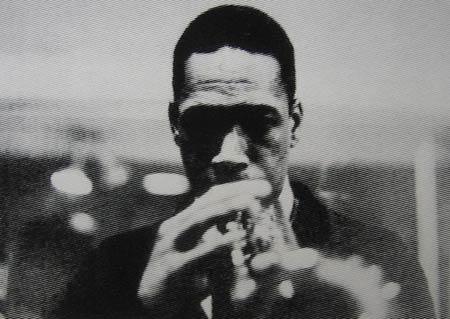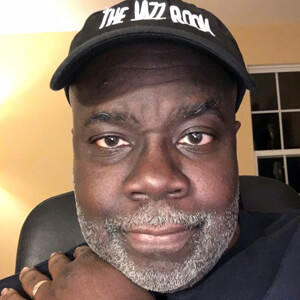Obscure Trumpet Masters – Dupree Bolton
Dupree Bolton (1929 – 1993)
“If things had worked out right for [Dupree] he could have been one of the most important trumpet players of our time. There was a certain grandeur he was able to capture. . . He had a unique, fresh quality—something different.” – Harold Land on Dupree Bolton
 There are Obscure Trumpet Masters…and then there’s Dupree Bolton. To say that a shroud of mystery has always surrounded Bolton would be an understatment. Bolton never led an actual recording session under his own name. He appeared, seemingly from nowhere in California in 1959 and set the West Coast jazz world abuzz with his performance as a sideman. He then disappeared just as quickly and reappeared a few years later, again as a sideman, displaying mind-blowing chops. He was then gone again, never to officially record again for the remainder of his life.
There are Obscure Trumpet Masters…and then there’s Dupree Bolton. To say that a shroud of mystery has always surrounded Bolton would be an understatment. Bolton never led an actual recording session under his own name. He appeared, seemingly from nowhere in California in 1959 and set the West Coast jazz world abuzz with his performance as a sideman. He then disappeared just as quickly and reappeared a few years later, again as a sideman, displaying mind-blowing chops. He was then gone again, never to officially record again for the remainder of his life.
Who was Dupree Bolton, where did he come from and where did he go? The information will forever remain sketchy, at best. The most that we know comes from the indefatigable work of the noted jazz historian and writer, Ted Gioia, who, with a great deal of effort, managed to track down Bolton, in person, during his later years. The facts in this post come in large part, from Mr. Gioia’s moving two-part article about his encounters with Mr. Bolton, titled In Search of Dupree Bolton. Clicking on the title will take you to Gioia’s article.
So what do we know about Dupree Bolton? He was born in Oklahoma City on March 3, 1929. His father was an accomplished musician who was reportedly one of the great Charlie Christian’s early influences. His father supplemented a meager musical income by working in the defense industry, which led the family to move to Southern California. Though his father wanted him to play the violin, young Dupree became enthralled with the trumpet in school. His father reluctantly agreed to buy him one.
Young Bolton quickly mastered the trumpet and by his early teens, he was good enough to play professionally. He lied about his age, ran away from home and joined Jay McShann’s band in 1944, just before his 15th birthday. Life on the road caused Bolton to be introduced to drugs at this young age. He was first arrested for dealing and possession on the day before his 17th birthday. He was incarcerated until he was 21. He returned home to Los Angeles upon his release, shedding and picking up the occasional gig.
He idolized the great bop trumpeter Fats Navarro and like his idol, Bolton was by now an incredibly gifted musician with a heavy heroin habit. He was arrested again in 1951, this time for forgery and did a four-year bid in Soledad. During that time he continued to practice his horn, concentrating on the mechanics, sometimes for 12 – 14 hours a day. Bolton was released in 1956, but almost immediately went back to jail on another forgery conviction, for another three-year stint, which meant more practice time. By the time he emerged in 1959, Dupree was a full-fledged trumpet monster.
He started hitting the L.A. clubs, blowing cats off the stand at the jams. Harold Land and Elmo Hope were getting ready to make a recording featuring, Hope’s tricky charts, so they needed a trumpet player who could not only blow like mad but was an excellent reader as well. They had heard about Bolton and went down to a club in Watts to hear him in person. Land and Hope knew that their search was over. The album became known as The Fox, after Hope’s blazingly fast, intricate composition. The then unknown Bolton enters at around 1:40 and takes the listener on a ride of amazing speed and precision. He hits all of the marks technically without dropping a single beat and with boundless creativity. The only personal experience I can compare it to is a ride on The Incredible Hulk coaster at Universal Studios.
Based on his performances on The Fox, the jazz world wanted to know about Bolton, who he was, where he had come from. But Bolton remained famously reticent in the face of his new-found fame. When John Tynan attempted to interview Bolton for Downbeat, Dupree gave him a one sentence interview “When I was fourteen, I ran away from home.”
Bolton would not have much time to enjoy his fame, as we was arrested again shortly after the release of The Fox and sent to San Quentin, where he remained until 1962. Upon his release, saxophonist Curtis Amy tracked Bolton down to work with him on what would become Katanga! , Amy’s most famous album. Again, Bolton steals the damn show, displaying incredible fire, especially on the title track, which he wrote. A few weeks later, Bolton joined Amy in a session band put together by arranger Onzy Matthews to back Lou Rawls. These would be Dupree Bolton’s last commercial recordings. He did a couple of television appearances with Amy after the release of Katanga! (some of which you see with this post), but a short time later, Bolton was arrested again and sent back to San Quentin, where he continued to be housed on and off, for drug and forgery related offenses, for the better part of the next two and a half decades.
Dupree Bolton was released from prison for the last time, around 1983. Though he had practiced on and off during his various incarcerations, he had become by then a forgotten figure in jazz. He played briefly with Bobby Hutcherson during one of his releases, in 1967. Bolton also played with a prison band, while imprisoned near Tulsa in 1980, the results of which were recorded, but summarily dismissed by Bolton in his later years. In 1982, he played with Dexter Gordon in Oklahoma City, but that was all that was heard from Bolton, until Ted Gioia tracked him down in 1989.
Mr. Gioia spent some fleeting time with Bolton in 1989 after going to great lengths to track Bolton down in the San Francisco area, where Bolton had finally settled after his last release from prison. As usual, Bolton kept a low profile; he was still occasionally seen playing on the Bay Area streets; not nearly the firebrand that he once was, but showing brief flashes of excellence which let band mates and passersby know, that this was no ordinary cat.
Dupree Bolton died of cardiac arrest on June 5, 1993. He was 64 years old. Thanks to Ted Gioia, we know more than we would have about Bolton, but we will never escape the longing for what might have been.
Recommended Recordings:
- Fireball (Uptown Jazz) – CD in print; mp3 available [This is a compilation of the audio tracks from a 1962 television appearance with Curtis Amy, plus two studio one offs from the same era and the two tracks recorded in prison in 1980. It’s the only recording released under Bolton’s name]
- The Fox [Harold Land] (OJC) – CD in print; mp3 available
- Katanga! [Curtis Amy] (Pacific Jazz) – CD OOP but available (mostly as a high priced import)
About the Author
Curtis Davenport
Curtis is a jazz historian, blogger and veteran radio personality. He currently produces the popular blog, CurtJazz.com and the web-based radio station, CurtJazz Radio.
Follow Curtis on his website, Curt's Jazz Cafe, CurtJazz Radio, Facebook and Twitter.
